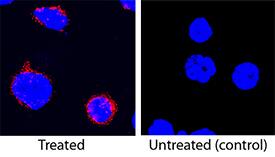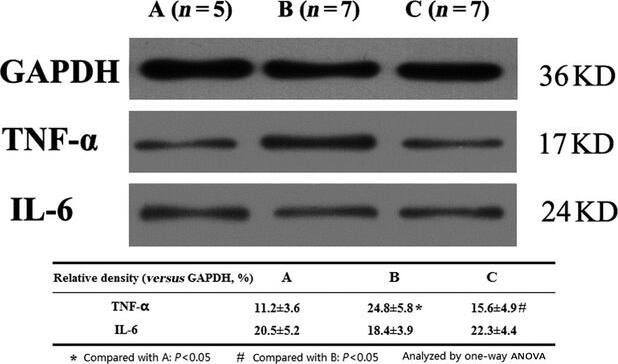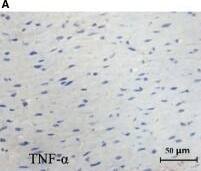Porcine TNF-alpha Antibody
R&D Systems, part of Bio-Techne | Catalog # MAB6903


Key Product Details
Validated by
Species Reactivity
Validated:
Cited:
Applications
Validated:
Cited:
Label
Antibody Source
Product Specifications
Immunogen
Arg78-Leu232
Accession # P23563
Specificity
Clonality
Host
Isotype
Endotoxin Level
Scientific Data Images for Porcine TNF-alpha Antibody
Cytotoxicity Induced by TNF-alpha and Neutralization by Porcine TNF-alpha Antibody.
Recombinant Porcine TNF-a (Catalog # 690-PT) induces cytotoxicity in the the PK-15 porcine kidney epithelial cell line in a dose-dependent manner (orange line). Cytotoxicity elicited by Recombinant Porcine TNF-a (0.05 ng/mL) is neutralized (green line) by increasing concentrations of Mouse Anti-Porcine TNF-a Monoclonal Antibody (Catalog # MAB6903). The ND50 is typically 0.005-0.02 µg/mL in the presence of the metabolic inhibitor actinomycin D (1 µg/mL).TNF‑ alpha in Porcine PBMCs.
TNF-a was detected in immersion fixed porcine peripheral blood mononuclear cells treated with calcium ionomycin and PMA using Mouse Anti-Porcine TNF-a Monoclonal Antibody (Catalog # MAB6903) at 25 µg/mL for 3 hours at room temperature. Cells were stained using the NorthernLights™ 557-conjugated Anti-Mouse IgG Secondary Antibody (red; Catalog # NL007) and counterstained with DAPI (blue). Specific staining was localized to cytoplasm. View our protocol for Fluorescent ICC Staining of Non-adherent Cells.Detection of Porcine TNF-alpha by Western Blot
Protein expression of TNF-alpha and IL-6 were detected by Western blot. (A) Sham-operation group; (B) CME group; (C) treatment group. Image collected and cropped by CiteAb from the following open publication (https://pubmed.ncbi.nlm.nih.gov/25130514), licensed under a CC-BY license. Not internally tested by R&D Systems.Applications for Porcine TNF-alpha Antibody
Immunocytochemistry
Sample: Immersion fixed porcine peripheral blood mononuclear cells (PBMCs) treated with calcium ionomycin and PMA
Western Blot
Sample: Recombinant Porcine TNF-alpha (Catalog # 690-PT)
Neutralization
Reviewed Applications
Read 1 review rated 4 using MAB6903 in the following applications:
Formulation, Preparation, and Storage
Purification
Reconstitution
Formulation
Shipping
Stability & Storage
- 12 months from date of receipt, -20 to -70 °C as supplied.
- 1 month, 2 to 8 °C under sterile conditions after reconstitution.
- 6 months, -20 to -70 °C under sterile conditions after reconstitution.
Background: TNF-alpha
Tumor necrosis factor alpha (TNF-alpha), also known as cachectin and TNFSF2, is the prototypic ligand of the TNF superfamily. It is a pleiotropic molecule that plays a central role in inflammation, apoptosis, and immune system development. TNF-alpha is produced by a wide variety of immune and epithelial cell types (1, 2). Porcine TNF-alpha consisits of a 35 amino acid (aa) cytoplasmic domain, a 21 aa transmembrane segment, and a 176 aa extracellular domain (ECD) (3). Within the ECD, porcine TNF-alpha shares 69%‑86% aa sequence identity with bovine, canine, cotton rat, equine, feline, human, mouse, rat, and rhesus TNF-alpha. The 26 kDa type 2 transmembrane protein is assembled intracellularly to form a noncovalently linked homotrimer (4). Ligation of this complex induces reverse signaling that promotes lymphocyte costimulation but diminishes monocyte responsiveness (5). Cleavage of membrane bound TNF-alpha by TACE/ADAM17 releases a 55 kDa soluble trimeric form of TNF-alpha (6, 7). TNF-alpha trimers bind the ubiquitous TNF RI and the hematopoietic cell-restricted TNF RII, both of which are also expressed as homotrimers (1, 8). TNF-alpha regulates lymphoid tissue development through control of apoptosis (2). It also promotes inflammatory responses by inducing the activation of vascular endothelial cells and macrophages (2). TNF-alpha is a key cytokine in the development of several inflammatory disorders (9). It contributes to the development of type 2 diabetes through its effects on insulin resistance and fatty acid metabolism (10, 11).
References
- Idriss, H.T. and J.H. Naismith (2000) Microsc. Res. Tech. 50:184.
- Hehlgans, T. and K. Pfeffer (2005) Immunology 115:1.
- Pauli, U. et al. (1989) Gene 81:185.
- Tang, P. et al. (1996) Biochemistry 35:8216.
- Eissner G. et al. (2004) Cytokine Growth Factor Rev. 15:353.
- Black, R.A. et al. (1997) Nature 385:729.
- Moss, M.L. et al. (1997) Nature 385:733.
- Loetscher, H. et al. (1991) J. Biol. Chem. 266:18324.
- Clark, I.A. (2007) Cytokine Growth Factor Rev. 18:335.
- Romanatto, T. et al. (2007) Peptides 28:1050.
- Hector, J. et al. (2007) Horm. Metab. Res. 39:250.
Long Name
Alternate Names
Entrez Gene IDs
Gene Symbol
UniProt
Additional TNF-alpha Products
Product Documents for Porcine TNF-alpha Antibody
Product Specific Notices for Porcine TNF-alpha Antibody
For research use only


